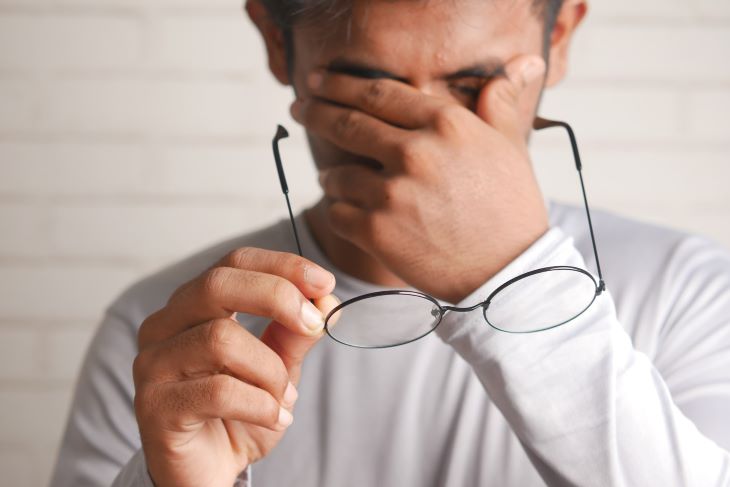Gambling Addiction
Quick Links for Gaming Addiction
- What is a gambling addiction?
- Who can become addicted to gambling?
- Why do people become addicted to gambling?
- What are the signs and symptoms of gambling addiction?
- What are the long-term risks of gambling addiction?
- Recovering from a gambling addiction
- References for gambling addiction
Gambling addiction is an impulse-control disorder (also called a behavioural addiction) and is also known by the names compulsive gambling, pathological gambling, or gambling disorder.
It can affect anyone and typically presents as a lack of control around the frequency of gambling and the amount of money gambled.
More than just an obsession with playing the slots or a few too many trips to the betting shop – gambling addiction can lead to financial and legal troubles, damage to relationships, and even suicide.
What is a gambling addiction?

Patient and therapist talking about gambling addiction
Not everyone who gambles has an addiction, but the issue of addiction gambling is more prevalent in the UK than once previously thought.
Almost 1.4 million people in the UK are thought to be problem gamblers, and almost half of these people are not getting the help that they need. [1]
An addiction to gambling is defined as gambling behaviour that is destructive or disruptive to everyday life, physical health, and/or emotional wellbeing.
A person who is addicted to gambling may struggle to cut down or completely stop their behaviour, and may take drastic measures such as stealing and committing fraud in order to obtain money for gambling.
It can consume their time and thoughts, damage their relationships and even lead to major legal and financial issues.
Who can become addicted to gambling?

Medical professional taking notes whilst discussing gambling addiction
People from all walks of life struggle with gambling addictions, and the inability to control the urge to gamble can sneak up on anyone.
However, there are a number of risk factors that can increase the chance of developing a gambling addiction. [2]
1. Underlying issues
People who struggle with a gambling addiction may also be dealing with other issues such as substance abuse, bipolar disorder, anxiety, stress, depression or ADHD that aren’t being properly treated.
Without the appropriate help for these issues, these people are at a much greater chance of developing a gambling addiction.
2. Loneliness
Many people begin visiting betting shops as a social activity, allowing them to meet other people and feel like part of a group.
When socialising begins to revolve around gambling, the chance of becoming addicted is increased and it can be difficult to get out of this cycle.
3. Social influences
If an individual is surrounded by other people who frequently gamble and visit betting shops, they may see it as a healthy activity and not realise that they may have a problem. If they attempt to cut down or stop completely, the people around them may encourage them to continue gambling.
4. Certain medications
There are a handful of medications known as dopamine agonists with a rare side effect that can result in compulsive behaviour such as problem gambling. [3]
It’s important to be aware of any potential side effects for any medication that is prescribed – speak to your doctor if you have any concerns.
5. Ease of access
With the rise of online betting shops and gambling apps, it’s never been easier to place a bet from the comfort of your own home.
This ease of access means that more people can gamble than ever before, while family and friends may not even be aware that it’s happening at all.
Why do people become addicted to gambling?

Young person in therapy for gambling addiction
When we take part in an activity that we find enjoyable, the brain’s reward system is activated and it releases dopamine (often known the ‘happy hormone’) which provides a sense of pleasure and even euphoria.
Gambling stimulates this reward system, releasing a hit of dopamine.
Studies have shown that the brain activity of a person who is addicted to gambling is very similar to the brain activity of a person who has taken addictive drugs. [4] And like drugs, it’s possible for the brain chemistry to be significantly altered by repeated exposure to gambling.
This means that the person feels the need to gamble more frequently or with more money in order to experience the same hit of dopamine, and these mental pathways can take months or even years to repair.
Gambling is exciting because of the uncertainty: there’s no guaranteed chance of a win, but the possibility and hope is always there.
During the build-up to a potential reward, the brain increases the amount of dopamine released.
It’s not always about winning – the very act of gambling itself results in pleasurable and often euphoric sensations.
If a person is addicted to gambling, the brain may even release dopamine when they lose money.
Instead of being disappointed and walking away, they are spurred on to try again.
The cycle of gambling can also keep people trapped in addiction. They often feel that they need to recover any money that they previously lost before they can stop gambling, and this can be a vicious spiral that leads to even more money lost and even more severe addiction.
What are the signs and symptoms of gambling addiction?

Two friends discussing gambling addiction
It can sometimes be difficult to spot the warning signs of gambling addiction, particularly if the individual is secretive about their actions.
One tell-tale symptom is the inability to cut back or completely stop gambling, even when these actions continually result in negative consequences.
It can feel very difficult for a gambling addict to extricate themselves from this world, as they often convince themselves that they’ll stop once they win back any money that they have lost.
Gambling addiction can result in a number of behavioural symptoms, all of which have a detrimental effect on a person’s general health and emotional well-being.
Symptoms of a gambling addiction
- Feeling unable to control their gambling – trying to cut back or stop entirely and being unable to
- Frequently thinking about gambling and how to get the money for it
- Being secretive about how often they gamble and how much money they put down
- Continuing to gamble even when they cannot afford to
- Increasing the amount of money spent on gambling
- Being vague about which websites they visit or which apps they have downloaded
- Visiting casinos or betting shops more frequently
- Stealing or committing fraud in order to obtain gambling money
- Lack of interest in general work and activities
- Attempting to recuperate lost funds by gambling more money
- Feeling agitated and/or irritable when not gambling, or when trying to cut down
- Ignoring family, work, and social responsibilities
- Denying that they have a problem with gambling
What are the long-term risks of gambling addiction?

Exhausted person suffering from the consequences of gambling addiction
While a gambling addiction may not pose as much of a risk to general health when compared to an alcohol or drug addiction, it still comes with its own set of long-term risks.
In the worst cases, a gambling addiction can cause so much mental and emotional stress that the affected person may begin to see suicide as their only way out.
They may feel incredibly guilty about causing stress to their family and friends and could begin to consider taking their own life.
If you or someone you know is experiencing suicidal thoughts, reach out for help straight away. Suicide is never the answer and every problem has a solution, no matter how large or complicated.
Long-term risks of a gambling addiction
- Financial difficulties – debts to loan companies or family and friends, having little to no savings
- Legal troubles – being arrested or imprisoned
- Damage to relationships with friends and family
- Poor performance at work can lead to job loss
- Severe feelings of guilt, anxiety, and depression
- Increased risk of suicide
Recovering from a gambling addiction

Individual therapy session for gambling addiction
Despite what many people may think, the biggest challenge of gambling addiction recovery isn’t the act of stopping initially – rather, it is dealing with the temptation to gamble again and the accessibility of gambling apps and websites that make it much more difficult to stay away.
It’s possible to recover from gambling addiction by yourself, but long-term recovery is more likely when professional treatment is sought.
Talking therapies such as cognitive behavioural therapy can help to drill down to the root cause of the gambling addiction and provide mental tools to help you deal with stress and emotions in healthier ways, whilst peer support groups such as Gamblers Anonymous [5] can help you feel supported and less alone throughout your journey to recovery.
It’s also important to take care of the underlying issues that may have resulted in gambling addiction.
Treatment is available for mental health disorders such as anxiety, bipolar disorder and depression, and even making simple changes to your lifestyle such as reducing work hours or distancing yourself from people who encourage you to gamble can make a huge difference.
No one needs to deal with a gambling addiction alone.
There is a wealth of support out there with numerous professional treatments available, including both inpatient treatment and outpatient treatment. Our team is available to help you find the best treatment options to suit your needs.
Many of our team have been in your shoes, and they know that there is much more to recovering from a gambling addiction than simply avoiding betting shops and casinos.
Get in touch today and take that first step on the path to recovery to a healthier, happier, and more fulfilled life.
Give our team a call for free on 0800 326 5559
References for Gambling Addiction
[1] https://www.gamblingcommission.gov.uk/PDF/survey-data/Gambling-behaviour-in-Great-Britain-2016.pdf
[2] https://www.ncbi.nlm.nih.gov/pmc/articles/PMC9994414/
[3] https://www.ncbi.nlm.nih.gov/pmc/articles/PMC5762774/






